Izhevsk SOBR: fellow countrymen of Kalashnikov
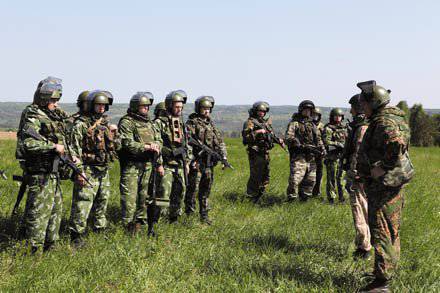
History the police special forces of the Ministry of Internal Affairs for the Udmurt Republic begins in 1986, when the special battalion was organized as part of the mobile battalion of the Ministry of Internal Affairs. In 1991, the platoon was expanded to a special-purpose company. Its main tasks were to ensure public order during mass events and rallies, to participate in the aftermath of emergency situations of a natural or man-made nature, when quick and effective assistance was required to ensure the safety of the population.
When the Decree of the President of Russia “On Strengthening the Fight against Organized Crime” entered into force in 1993 and OOP and special rapid response units were created in the regions to provide force support for operational activities, the best fighters of the spetsnaz company became the main core of Izhevsk Special Security Forces. However, combat work without operational developments is not at all effective, so the department was supplemented with the best operatives from various departments of the criminal police. Such an alloy gave a good result.
In the 2002 year, as a result of organizational and staff changes in the Ministry of Internal Affairs of the Russian Federation, the SOBR UBOP of the Ministry of Internal Affairs of the Udmurt Republic was renamed the Sobol special police unit of the criminal police of the Udmurt Republic. Last year, after reforms and a series of renames, the special forces of the police returned the historical name - SOBR.
The current commander of SOBR "Sobol" of the Ministry of Internal Affairs for the Udmurt Republic, the first holder of the Order of Courage in Udmurtia, police colonel Marat Sibaev has been in the Izhevsk special forces for 20 years. Having passed all the steps of the career ladder, he led the detachment in 2005.
One of the legends of Russian law enforcement agencies is a holder of three Orders of Courage, four medals "For Courage", medals of the Order For Services to the Fatherland, I and II degrees, police colonel Oleg Matveyev, familiar with Sibaev from childhood, they were engaged in a parachute club. Then, when Oleg and his brother Konstantin returned from military service from Afghanistan in the 1988 year, fate brought them back to the MVD special forces and since then has not released them.
Police Colonel Marat Sibaev tells about the history of the formation and combat everyday life of the Izhevsk special forces:
- Alexander Usatov was the first head of the fifth, combat, department of the republican UOP. Rashit Polov and Vladimir Martyanov worked as his deputies, Oleg Matveev, Alexander Umrilov, Alexei Gruzdev, Sergey Fomin, Vladimir Stepanov became the backbone of the department. Soon Usatov was transferred to work in Votkinsk, and Polov was appointed head.
The activity of members of organized criminal groups, their cynicism and cruelty, impudence remained unpunished for the time being. Soon the bandits met a worthy rebuff in the person of the UOP. And SOBR, designed for lightning-fast and tough operations, from the very first days of its formation began to carry out special measures to detain criminals, often using weapons.
In September 1993, we detained a criminal group involved in the illegal circulation of non-ferrous, rare earth and precious metals. During the searches, 150 kilograms of uranium, 100 kilograms of nickel, cold steel and firearms, parts and assemblies for handicraft firearms, and other material assets stolen from the Chepetsk Mechanical Plant in the city of Glazov were confiscated from the bandits.
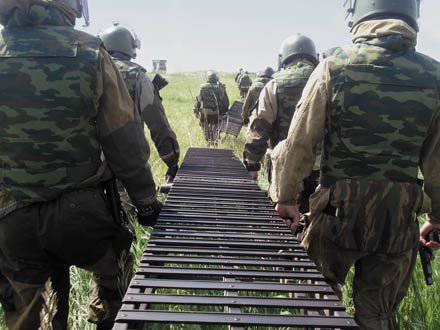
The next operation was the detention of an armed gang that killed the first deputy minister of internal affairs of Udmurtia, police colonel Nikolai Perevoshchikov and his family. The attackers, shooting the sleeping on the night of October 9, thought that the operation prepared by the colonel to detain OPS members would be canceled. However, the successors Perevoshchikova acted while hot. For several days, a dozen criminals were arrested, 44 units of firearms, 19 gas units, 800 units of ammunition, more than a kilogram of drugs were seized, 7 stolen vehicles were found.
In the summer of 1995, they managed to detain 11 members of a criminal group engaged in the theft of components from the Izhevsk Mechanical Plant and the manufacture of small arms from them and their sale. The Kulibins were seized 6 pistols and 23 revolvers, an F-1 hand grenade, a large number of components and ammunition, a large amount of cash in rubles and foreign currency.
Soon, in the course of the special operation, when trying to sell firearms, 4, a member of another criminal group, under underground conditions, gathered military firearms from parts stolen from military-industrial complex enterprises. The 21 machine gun AKM-74 without numbers, two hundred cartridges of various calibers, tools and accessories for the manufacture of hand-made machines, parts and spare parts for AKM were seized from them.
Then the first Chechen campaign began. 24 January 1995 of the year, supplemented by two Nizhny Novgorod detachment through Vladikavkaz and Mozdok arrived in Znamensky district of Chechnya. We worked with GUBOP operatives, officers of the GRU, FSK and military intelligence throughout the region from Tolstoy-Yurt to Goragorsky. For forty-six days, business trips took part in thirteen combat operations. They seized weapons and ammunition, cleared objects, and detained members of bandit groups and their accomplices.
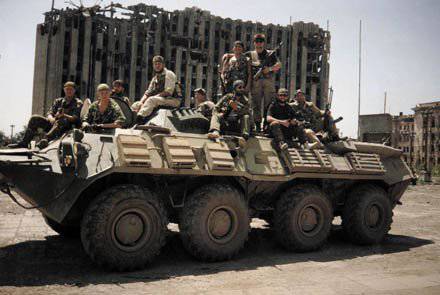
In February, when organizing an ambush in one of the villages, Oleg Matveyev was contused. Despite a severe headache, Oleg refused to be hospitalized and remained in the ranks until the end of the special event. Matveyev is a uniquely patient person for pain. Once, before a business trip, when a candidate master of sports, boxing master armed with two axes, was detained, he climbed the balconies to the third floor and with a hand numbed after an ax butt and an injured foot, he threw the raging athlete to the floor. With the help of a friend who came to his rescue, he tied up a bojan and delivered it to the department.
In the summer, the department worked in the vicinity of Gudermes, participated in operational-search activities, and detained armed Dudayevites.
Our department suffered its first losses during the third, autumn, business trip to Chechnya.
October 10 killed the senior police lieutenant Yuri Malykh, operative UBOP. He was on a temporary base, in the first commandant's office in Grozny. Suddenly, the militants began to fire at the commandant's office from grenade launchers. In the course of the defense of the building, Jura ran into the location, wanted to bring additional ammunition from the back room to the firing position. At that moment, a grenade from a militia grenade launcher flew there. From the explosion, grenades detonated the ammunition that was in the back. A blast wave broke up a stone wall, demolished partitions, squeezed all inventory into an accordion. Yura died, injured, incompatible with life.
By order of the Ministry of Internal Affairs of Russia, Yuri Alekseevich Malykh is permanently included in the lists of personnel of the Department for Combating Organized Crime of the Ministry of Internal Affairs of the Udmurt Republic.
The most difficult time in the first Chechen campaign for us was March 1996.
It all started well, in January the deputy head of the republican Organized Crime Control Department Viktor Vyzhuzhanin was appointed deputy head of the temporary department of the Ministry of Internal Affairs for the Chechen Republic. The commander of our squad of twenty-two people went to Alexander Umrilov, his deputy - Igor Kozyrev. Arrived at Mozdok on January 10. Guarded the group headquarters there. In Grozny, they were engaged in stripping residential areas from militants, stood at roadblocks, escorted columns.
On March 5, the militants, taking advantage of the withdrawal of the army group of troops from Grozny to an operation in the mountainous regions of Chechnya, simultaneously attacked all the commandant's offices and roadblocks of the city. In defense of these strategic facilities, only small groups of Interior Ministry officers remained: divisions of various SWAT, riot police and internal troops. They took the brunt of the Dudayevites themselves. In the five days of incessant fighting in the grouping of troops, about a hundred people were killed, about three hundred were injured, and 30 armored vehicles were out of order.
Izhevtsy defended the bridge over the Sunzha River. When there were problems with ammunition, they requested air support. The helicopters, dropping several sighting smoke bombs, were forced to fly to the airfield because of the dense fire of the militants. There was no sense from a mortar bombardment of the militants' positions from the nearest commandant’s office either, the little brothers were not nearly buried alive. Then, together with the guys from the internal troops, we decided to leave, to break through the environment on our own on three infantry fighting vehicles and two armored personnel carriers. Under the cover of armor, they quickly left the bridge and took up defensive positions among reinforced concrete beams. There were few patrons left, the wounded were getting worse, sitting on the spot meant encirclement, death, captivity. Only one way out - move!
When they started loading onto armor, an officer from the Lipetsk Special Forces Division was wounded in the head, three more were wounded in the limbs. The one who got a bullet in his head rolled onto the asphalt, but the armored personnel carrier rushed forward, not to wait in the side of the grenade! Matveyev ran out of the ruins under fire, hooked the fallen Lipchane, dragged along behind him. Umrilov arrived to the rescue. Together they managed to throw the wounded man over to the last infantry fighting vehicle, but the doctors did not manage to save him, the boy died from his wounds along the way.
It was from that day that the permanent call sign of the SOBR - "Sobol" - was fixed in the name of the Udmurt special forces.
All the next day, a small column of special forces under the leadership of Kozyrev went to Lenin Avenue to help the comrades who remained in the besieged positions. Also, the guys picked up in the rubble of the streets and evacuated the bodies of the dead. Then Pavel Zmeev, Alexei Gruzdev, Yuri Shustov, Sergei Shvetsov, Vladislav Podkin acted courageously.
Umrilov, together with the Nizhny Novgorod brothers, was engaged in loading the dead and wounded into armored personnel carriers and Urals and delivering them from the GUOSh to the take-off of the Severny airport. There, having met with the officers of the Lipetsk SOBR who remained in the ranks, they went for identification.
Alexander Umrilov, following the results of the business trip, was awarded the Order of Merit for the Fatherland, IV degree. Captain Umrilov moved to the Izhevsk SOBR from the post of deputy battalion commander of the 104th Guards Red Banner Airborne Regiment, having two medals "For Military Merit".
During the break between the two wars in the Caucasus, there was no need to be bored. In March 1997, during a special operation, an underground workshop for the manufacture of military small arms and ammunition, located in a modest Izhevsk garage cooperative, was liquidated. The arsenal confiscated from the bandits was impressive! large-caliber tank Utes machine gun, two rifles, two Kalashnikovs, 29 pistols of various brands, including gas, prepared for conversion into military weapons, equipment, tools and accessories, components for the manufacture of military weapons, 8 devices for silent shooting, 45 fuses - detonators, a mountain of ammunition. It was possible to block the distribution channels of weapons coming from this criminal group to the Moscow region.
A month later, in the city of Sarapul, we detained a criminal group engaged in the supply of drugs from Kazakhstan to Udmurtia and Tatarstan, with more than 200 kilograms of marijuana and 7 kilograms of hashish. The drug addicts must have cried.
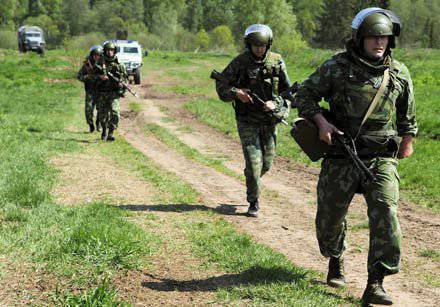
In January 1998, Ilyas Khannanov took command of the SOBR UBOP. A graduate of the Izhevsk Mechanical Institute, a former employee of the OSN "Krechet" UIN for SD. He took over the department, having already worked as a deputy, so he was familiar with the sore problems and the potential of the team firsthand.
In view of the experience gained in the fighting in Chechnya, the GDCOC of the Russian Interior Ministry introduced into the special forces a new program of combat and special training. Along with the traditional tactical and fire, it included amphibious training, mine explosive business and a number of special disciplines. Hannanov enthusiastically attracted the department to classes, and for good reason. A new war in the Caucasus began for us in September 1999, when the department’s snipers were seconded to the combined special forces detachment operating against the gangs in Dagestan. In October, with the introduction of troops into the territory of Chechnya, half of the SOBR personnel went there.
We flew in a circle, through Tyumen, there was formed a consolidated detachment of special forces of the Ural RUBOP. Then in Novosibirsk met with colleagues from the East-Siberian region. From there they went to Makhachkala, then to Kizlyar and, finally, to the stanitsa of Kargalinskaya of the Shelkovsky district of Chechnya, where the first combat tasks remained. Then they worked in Kurchaloy, Khasavyurt, throughout the Nozhai-Yurt and Vedeno districts. So, since the autumn of 1999, to the present day, our squad is in Chechnya without a break, the fighting squads replace each other, the schedule is calculated so that each employee goes to the Caucasus at least once a year.
In the summer of 2000, in the Kurchaloyevsky district, they stumbled into trouble. The crew of the BMP with the soldiers of the internal troops was ambushed, all were killed. In response, the troops blocked half of the villages in the district with the support of the parachute regiment and special forces of the Ministry of Internal Affairs. Our employees, who conducted search operations in the mountainous and wooded area behind the small village of Khidi Khutor, discovered a large cache of ammunition, weapons, medicines and ammunition. Started counting trophies. It turned out that the militants were not far away and, seeing us, did not want to peacefully release the cache, they began shelling. We, having taken all-round defense, answered, were involved in a shootout. Militants tried to attack, went ahead. The distance was reduced, no one wanted to give up.
Khannanov, who was in charge of the stripping operation in the neighboring village of Niki-Heath, heard the sounds of gunfire and sent a reserve armored group on two armored personnel carriers to the forest. Those drove the militants back into the depths of green, forced to retire. An hour later, a spinner came up, helped with ammunition, and took the wounded Oleg Matveyev. The others examined the scene of the clash, where they found traces of blood, ammunition and medicines forgotten in a hurry.
In the summer, our group under the command of Roman Bespalov, together with special forces from Ufa and Kurgan, was lucky to work in the interests of the 45-th separate reconnaissance regiment of the Airborne Forces. It was commanded by Vadim Pankov, a paratrooper and a scout with a capital letter. Pankov, who soon received the deserved title of Hero of Russia, was very serious about the preparation of upcoming events and personally conducted classes with those who were to go into battle. He gave a lot to the guys not only in tactics and techniques of actions when conducting RPM, but also in terms of psychological preparation.
During the 2001 winter trip of the year, members of the squadron figured out and destroyed the Jihad-3 gang that conducted sabotage attacks against federal forces on Victory Avenue in Grozny. The guys independently calculated the possible place and time of the terrorist attack, where they later neutralized the gangsters at the moment of laying the bomb. On returning from the operation, their "half-dead colleagues" of the insurgents twice fired at them and their fellows from the Ufa SOBR. Thank God, there were contusions and tangential splinter wounds, everyone got to the base alive.
On June 11, in the course of reconnaissance, search and ambush operations in the Leninsky district of Grozny, police captain Dmitry Yakimov, an SOBR officer, was wounded by grenade fragments. Despite all the efforts of the doctors, Dmitry's life could not be saved; on June 23, 2001, he died in the hospital from his injuries.
He joined the police in December 1992, and in 1994 he became an officer in the SOBR. In June 1998, during the storming of an apartment in Sarapul, Dima personally neutralized an armed man who was holding an RG-42 live grenade without a safety pin. Yakimov was in Chechnya on his third business trip.
30 September 2001 in the village of Stariye Atagi as a result of a special operation with the participation of OSN Rus and the consolidated unit of SOBRov in the yard of a private house in an underground bunker were destroyed one of the financiers and intelligence leaders of the gangs Jordanian Abu Yacoub, known by the nickname Salman, and two his accomplices. The bandits obeyed the bloody field commander Khattab, supplied him with money from foreign sponsors and intelligence from local residents.
A makeshift mortar with ammunition, two grenade launchers, 7 AK assault rifles and 400 cartridges for them, shots for an underbarrel grenade launcher, 18 live grenades, 3 artillery shells were seized from Yakub's bunker.
The operation was delayed for the whole daylight, the battle groups stormed three houses at the same time. One of the houses turned out to be non-residential; in others, three relatives of the wanted militant lived. Relatives were interviewed and released. Tapping the floor of the house, probing every meter of yard land, found two caches. In the caches of weapons and ammunition, sets of foreign forms, mountain shoes, camouflage unloading, sleeping bags, backpacks, radio stations. Someone drew attention to the thick electrical cable, hiding in the ground near the summer kitchen. They began to dig along the cable, stumbled upon the brickwork. By all indications, it was a wall of a bunker, sheltered under the ground at a depth of several meters. Militants were probably hiding in the bunker. Under the washbasin of the summer kitchen they found a pipe sticking out of the ground disguised as a drain, apparently, a duct. Thrown into the pipe burned smoke smoke bombs, hoping that the smoke, coming out, will indicate a secret hole. There was no smoke, it turned out that the checkers were burned in a large hermetic room.
The commander of the OSN "Rus" Yuri Didkovsky decided to blow up the discovered masonry. They blew it up, grenades were thrown into the resulting hole. The fighter, who climbed into the hole, did not make out anything in the smoke and reported that the room was empty. Strange.
A heavy manhole, which served as an entrance, was found in the courtyard along a platform that reared around. The hatch was filled with concrete. They opened the hatch, and there - a ladder, on which the fighter climbs with raised hands. Twisted foe, and after him - two grenades fly up. One exploded, injured Didkovsky, the second - self-made - did not work. A couple of militants who were trying to get out into the light with automatic weapons at the ready, were filled up on the spot. Dungeon pelted with grenades. Abu Yakub, who was hiding in a far corner of the room, died from shrapnel wounds.
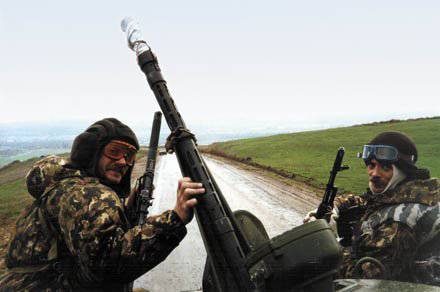
They climbed down and were stunned: the bunker turned out to be a comfortable building in which one could live for a month. Sofas, two dry closets, an electric stove and an impressive supply of food, video equipment, a radio station, the antenna of which was found on a nearby tree, air purification and regeneration systems. Technologies.
Six months later, we again got into a mess in Starye Atagi. The SOBR armored personnel carrier was fired from machine guns. Contrary to the assumptions of the militants, the guys who flew off the armor did not lie down in the shelter, but rushed forward. The attackers, leaving their weapons, ammunition and walkie-talkies, quickly disappeared into the thickets.
In the autumn of 2004, the officers who distinguished law enforcement in Udmurtia distinguished themselves. Together with the operatives of the Organized Crime Control Department, an organized criminal community that sold large quantities of drugs was discovered. In order to catch drug dealers in the act, they decided to conduct a special operation. The door of the apartment, in which the leader of the OPS with the heroin party was, was strengthened, and the criminal could destroy evidence during the autopsy, so high-rise specialists flew to the bandit through the windows at night, rapidly descending from the roof of the high-rise building by ropes. The offender did not have time to hide the evidence, did not have time to tear his eyes and shout.
28 August 2008 was another black day for our OMSN. In Grozny, killed a senior police sergeant Maxim Drovosekov, the driver of the second combat department. During the day, being a member of a combat support group of operational search activities in the Shatoy district, Maxim fulfilled all the tasks assigned to him, helped to detect and neutralize the masked weapons cache. In 17 hours 50 minutes, while returning from an ORM to Grozny, a car with employees was shot at, Drovosekov was fatally injured and died before the ambulance arrived on the spot.
Maxim went on long business trips to the North Caucasus three times, was awarded the medal "For Distinction in the Protection of Public Order".
Six months after the tragedy, the Minister of Internal Affairs of Udmurtia, Major General of Militia Vladimir Sosnovsky, handed over the Order of Courage to the parents of Maxim Olegovich Drovosekov.
The last few years have been restless in Dagestan. It is here that criminals of all stripes flock from the rest of the Caucasian republics, replenishing the gangs of home-grown scumbags. Hiding behind the sacred banner of Islam, they create chaos: they kill law enforcement officers, government officials, journalists, clergy, everyone who is trying to maintain peace and prosperity in the ancient land of Dagestan.
14 of August last year during a special operation in the Khasavyurt district of Dagestan in a car accident near the village of Batashyurt police major Abukar Rizakhanov was killed. For 17 years of service in the Ministry of Internal Affairs, 94 incentives were collected in his personal file, including medals of the Order for Services to the Fatherland, I and II degrees, two medals "For Courage", and the medal "For Difference in Protection of Public Order". Abukar was the most experienced warrior, but the twelfth official business trip to the Caucasus became fatal for him.
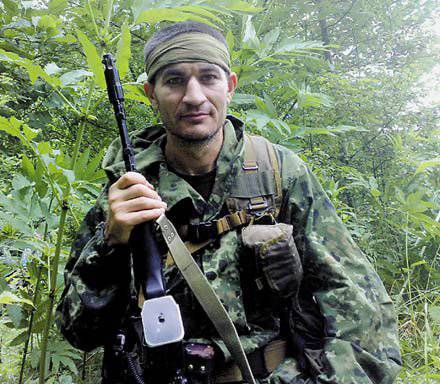
Abukar Balabekovich was born in 1974 year and lived in the mountain village Syrtich, Tabasaran district of Dagestan, before being drafted into the army. He served in the internal troops in Izhevsk, where he remained, going to work in the police, in the regiment of the patrol and inspection service. The teaching staff, besides quenching and operational skills, gave Abukar marital happiness - during one of his duties he met his soul mate. Saving a pretty student, Galina, from harassment of a drunken passer-by, the police officer did not expect that she would soon become a faithful wife and ally, the mother of two of his children.
Four years Rizakhanov as part of duty orders ensured order on the street, then made his way to the SWAT. The UBOP, in addition to the usual service for the special forces, successfully used Rizakhanov and in the work undercover. Charismatic Abukar, the owner of a typical Caucasian appearance, under the guise of criminal authority was introduced into groups engaged in the sale of weapons and drugs. After a while, the “criminal authority” found ways to bring secretive bandits to clean water and organized arrests.
As part of the special operations unit of the FOG of the Ministry of the Interior of Russia, Rizakhanov in June 2011 participated in the storming of a house in the Naursky district of Chechnya, in which a wanted fighter, who had previously been a member of the Black Angel group of Ruslan Gelayev, was hiding. This fighter, having escaped from Russian justice, has been hiding in Ukraine in recent years and has returned to his homeland in order to feel the situation and, possibly, to do illegal activities again, but was tracked down and caught.
On August 14, Abukar detained a suspicious man. During a search, they found an improvised explosive device in his possession - a "Shahid's belt", grenades, extremist literature, a black canvas with Arabic script, usually used by bandits as a flag. The man admitted that at night a militant would come from the forest to a predetermined address to stock up on food and get information from an accomplice.
To the address, the group of Rizakhanov left in two cars in the evening. In order not to attract attention to themselves, the operatives were in civilian clothes. The Zhiguli belonging to the detainee was first driven by Abukar, the owner of the car was in the passenger seat. But a few kilometers from the village, for the sake of conspiracy, the major changed places with him: in a small village, the appearance of strangers would be noticed immediately, which meant that the local himself would drive his car. He, having driven away, quietly whispered a prayer and unexpectedly drove into the oncoming lane, right under the approaching multi-ton KamAZ. From a frontal collision, the Zhiguli crumpled like a tin can, the driver died on the spot, two policemen who were in the back seat, with numerous fractures that are not life threatening, were hospitalized. Rizakhanov, without regaining consciousness, died in the Khasavyurt hospital.
In total, in recent years, on the territory of the North Caucasus region, employees of the Izhevsk SOBR detained 75 active members of bandit groups, seized 70 units of military weapons and 30 grenades, 17 shots for RPGs, 3 installations of Fagot ATGMs and a car of ammunition, detained about 120 vehicles with obvious signs of a change in the factory marking, as well as being on the federal wanted list.
Last year, a group of our employees participated in a counter-terrorist operation in the Elbrus region of the Kabardino-Balkarian Republic, in the city of Tyrnyauz, where they fought bandits hiding in the mines of a tungsten-molybdenum plant.
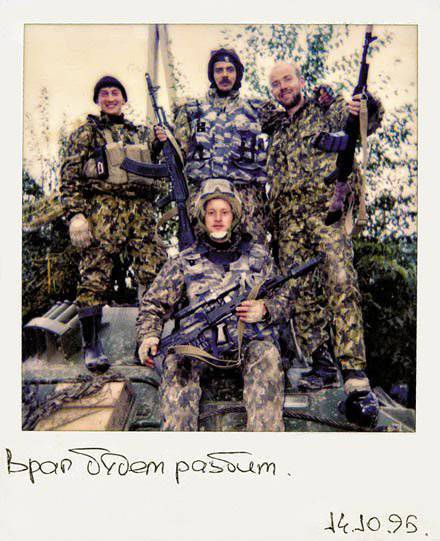
We also participated in measures to eliminate the consequences of a man-made emergency according to the Typhoon-1 plan, when a big misfortune occurred on the territory of the 102nd arsenal of the Main Rocket Artillery Directorate in the village of Pugachevo, Malopurginsky District, a spontaneous explosion of ammunition.
We gained good experience in 2006 in St. Petersburg, where we participated in the preparation and holding of the summit of the heads of eight states, an international club that unites the governments of Great Britain, Germany, Italy, Canada, Russia, the USA, France and Japan.
Today, our detachment is a well-coordinated, well-trained, highly mobile unit. The words “I serve the Fatherland and special forces” are not just words for us, but the meaning of life!
Information